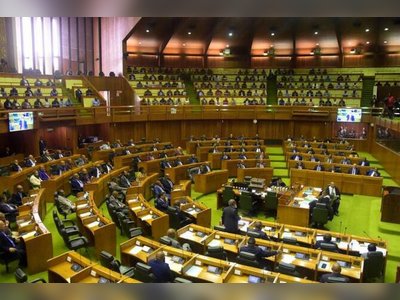
Taiwan Voters Decide on Recall of Opposition Lawmakers and Nuclear Power Referendum
Taiwan voters are deciding whether to recall opposition lawmakers and considering a return to nuclear power.
TAIPEI: Voters in Taiwan are currently casting their ballots to decide whether to dismiss seven opposition members from the legislature.
This decision comes as the island considers a return to nuclear power, five months after the last operating reactor shut down.
The recall votes, the second in a month, aim to restore ruling party control of the legislature following the Democratic Progressive Party's (DPP) loss of majority status in the 2024 election.
The Nationalist Party, also known as the Kuomintang (KMT), has managed to maintain its position after 24 members survived the first round of recall votes on July 26.
The DPP won the presidency in 2024 but neither party holds a majority in the 113-seat legislature, with the KMT securing 52 seats.
To bypass legislative obstacles, the Nationalists have allied with the Taiwan People’s Party to pass legislation, which has caused dissatisfaction among the ruling DPP. THE REFERENDUM ON NUCLEAR POWER The DPP has been gradually phasing out nuclear power, a source that once contributed approximately 20 percent of Taiwan’s electricity.
The last operating reactor at Taiwan's three nuclear plants was shut down in May after serving for 40 years.
However, the same month saw the legislature approve a proposal from the Taiwan People’s Party to hold a referendum on extending nuclear power, with the support of the Nationalists.
This referendum asks voters if the most recently shut nuclear plant should continue operating, pending regulatory approval.
The Maanshan plant, commonly known as the third nuclear power plant, is located near Taiwan’s southern tip.
Proponents of nuclear power argue that it would lower electricity bills and help meet the growing demand for power from artificial intelligence applications.
Notably, Jensen Huang, the Taiwan-born founder of American chip giant Nvidia, expressed support for nuclear power upon his arrival in Taipei.
Citing AI's energy requirements, he stated that he hopes all options will be explored, mentioning sustainable alternatives such as solar and wind energy.
In May, Nvidia announced a partnership with Taiwanese electronics manufacturer Foxconn to build an AI supercomputer for researchers and companies on the island.
This decision comes as the island considers a return to nuclear power, five months after the last operating reactor shut down.
The recall votes, the second in a month, aim to restore ruling party control of the legislature following the Democratic Progressive Party's (DPP) loss of majority status in the 2024 election.
The Nationalist Party, also known as the Kuomintang (KMT), has managed to maintain its position after 24 members survived the first round of recall votes on July 26.
The DPP won the presidency in 2024 but neither party holds a majority in the 113-seat legislature, with the KMT securing 52 seats.
To bypass legislative obstacles, the Nationalists have allied with the Taiwan People’s Party to pass legislation, which has caused dissatisfaction among the ruling DPP. THE REFERENDUM ON NUCLEAR POWER The DPP has been gradually phasing out nuclear power, a source that once contributed approximately 20 percent of Taiwan’s electricity.
The last operating reactor at Taiwan's three nuclear plants was shut down in May after serving for 40 years.
However, the same month saw the legislature approve a proposal from the Taiwan People’s Party to hold a referendum on extending nuclear power, with the support of the Nationalists.
This referendum asks voters if the most recently shut nuclear plant should continue operating, pending regulatory approval.
The Maanshan plant, commonly known as the third nuclear power plant, is located near Taiwan’s southern tip.
Proponents of nuclear power argue that it would lower electricity bills and help meet the growing demand for power from artificial intelligence applications.
Notably, Jensen Huang, the Taiwan-born founder of American chip giant Nvidia, expressed support for nuclear power upon his arrival in Taipei.
Citing AI's energy requirements, he stated that he hopes all options will be explored, mentioning sustainable alternatives such as solar and wind energy.
In May, Nvidia announced a partnership with Taiwanese electronics manufacturer Foxconn to build an AI supercomputer for researchers and companies on the island.











